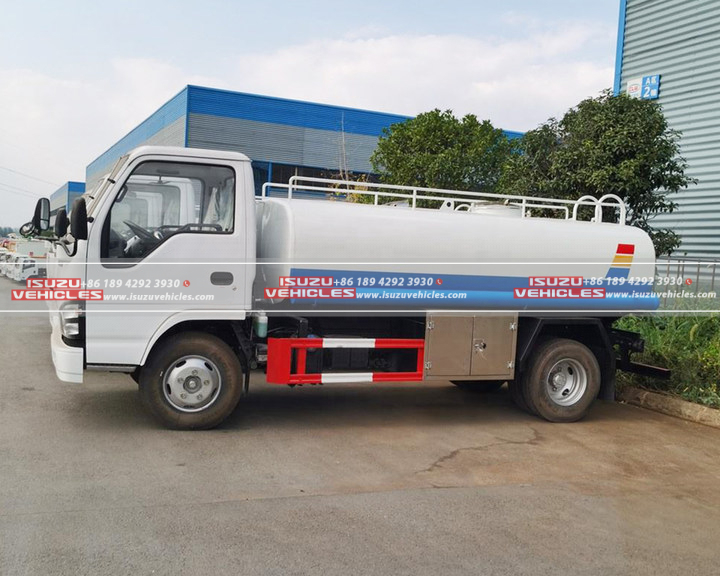ISUZU sprinkler trucks play a vital role in maintaining clean, safe, and sustainable urban environments. From dust control on construction sites to watering municipal parks, these vehicles are engineered to deliver precise water distribution where it’s needed most. However, their effectiveness hinges on proper maintenance and operation. Neglecting upkeep can lead to uneven water coverage, mechanical failures, or even costly downtime. By understanding how to care for an ISUZU sprinkler truck—and leveraging lessons from maintaining other ISUZU vehicles like the ISUZU sweeper truck and ISUZU garbage truck—operators can ensure these trucks remain reliable partners in urban management. This guide explores essential practices to keep your sprinkler truck performing at its best.
1. The Importance of Regular Maintenance for Optimal Performance
Sprinkler trucks are complex machines with interconnected systems, from water pumps and nozzles to hydraulic controls and chassis components. Regular maintenance isn’t just about preventing breakdowns; it’s about ensuring consistent water distribution, which is critical for tasks like suppressing dust at construction sites or irrigating public green spaces. A well-maintained ISUZU sprinkler truck operates efficiently, conserves water, and reduces wear on parts, ultimately saving time and resources.
Like the ISUZU sweeper truck, which relies on clean filters and functioning brushes to keep streets spotless, or the ISUZU garbage truck, which needs reliable compactors to manage waste, the sprinkler truck depends on its core systems working in harmony. For example, clogged nozzles can disrupt water flow, while a failing pump might reduce pressure, leaving areas under-watered. By adopting a proactive maintenance mindset, operators can address small issues before they escalate, ensuring the truck remains a dependable asset.
2. Key Maintenance Practices for Sprinkler Trucks
To keep an ISUZU sprinkler truck in top condition, operators should focus on three core areas: daily inspections, fluid management, and component care. These practices mirror the upkeep routines of other ISUZU municipal vehicles, such as the ISUZU sweeper truck and ISUZU garbage truck, which also require meticulous attention to detail.
Daily Inspections: Start with the Basics
Before starting the truck, conduct a thorough visual inspection. Check for leaks in the water tank, hoses, and connections, as even minor drips can lead to water waste or system pressure loss. Inspect the nozzles for clogs caused by debris or mineral buildup—a common issue in sprinkler systems. Clean or replace nozzles as needed to ensure even spray patterns. Additionally, examine the truck’s chassis, tires, and brakes, just as you would for a ISUZU garbage truck, to guarantee safe operation on roads and job sites.
Fluid Management: Water, Oil, and Hydraulics
The sprinkler truck’s water tank should be rinsed regularly to prevent sediment accumulation, which can clog filters and damage pumps. Use quality water sources to minimize contaminants, and consider installing inline filters for added protection. Beyond water, monitor hydraulic fluid levels and quality, as the hydraulic system powers the truck’s spray arms and pressure controls. Dirty or degraded fluid can lead to sluggish performance or component wear. Similarly, check engine oil and coolant levels to avoid overheating, a practice equally critical for the ISUZU sweeper truck’s engine longevity.
Component Care: Pumps, Valves, and Electrical Systems
The water pump is the heart of the sprinkler truck. Listen for unusual noises during operation, which could indicate worn bearings or impeller damage. Lubricate moving parts as recommended by the manufacturer and replace seals if leaks develop. Inspect control valves for smooth operation, ensuring they open and close without sticking. Electrical systems, including sensors and control panels, should be kept dry and free of corrosion—a lesson learned from maintaining the ISUZU garbage truck’s compacting mechanisms.
3. Leveraging ISUZU’s Expertise for Long-Term Reliability
ISUZU designs its vehicles with durability in mind, but even the toughest trucks benefit from professional support. The company offers a wealth of resources to help operators maintain their sprinkler trucks, including detailed service manuals, genuine replacement parts, and access to certified technicians. Regular servicing at an ISUZU-authorized center ensures that specialized components, such as the water pump or hydraulic systems, receive expert attention.
For fleets that also operate a ISUZU sweeper truck or ISUZU garbage truck, integrating maintenance schedules can streamline operations. Many upkeep principles overlap—for instance, hydraulic fluid checks are as vital for a sweeper truck’s brushes as they are for a sprinkler truck’s spray arms. By adopting a unified approach, businesses can reduce downtime and extend the lifespan of their entire ISUZU fleet.
Training is another critical factor. ISUZU provides operator training programs that cover best practices for vehicle care, ensuring teams understand how to handle minor repairs or troubleshoot issues like uneven water distribution. Knowledgeable operators are better equipped to spot early warning signs, whether it’s a drop in water pressure or an unusual vibration in the pump.
Maintaining an ISUZU sprinkler truck isn’t just about preserving machinery—it’s about upholding the quality of services that communities rely on. By prioritizing regular inspections, fluid management, and component care, operators can ensure these trucks deliver precise water distribution for years to come. And just as the ISUZU sweeper truck keeps streets clean and the ISUZU garbage truck manages waste efficiently, a well-maintained sprinkler truck plays a pivotal role in building healthier, more sustainable cities. With ISUZU’s engineering and support behind you, every drop of water counts.
